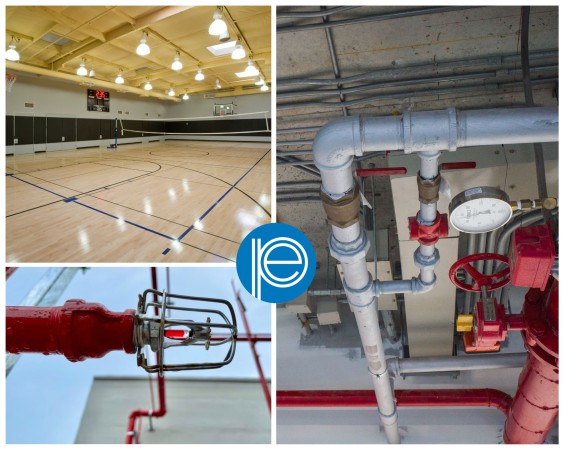The Vital Role of Sprinkler System Knowledge and Training
- 8/7/2025 10:00 am

Gymnasium floors are a significant investment for any school or municipality, providing a safe and suitable surface for sports and other activities. However, a damaged or malfunctioning sprinkler head can lead to extensive water damage and compromise the integrity of these specialized floors.
Public Entity Partners recommends that safety cages be installed over all sprinkler heads located in high-risk areas, such as gymnasiums.
Bear in mind, however, that sprinkler cages are not 100% effective in all cases. In this article, we will explore the importance of learning how to shut off a sprinkler system, identifying shut-off locations and providing proper training for employees to protect gymnasium floors from extensive water damage.
Recognizing the Risks
Whether it’s because of flying objects, such as basketballs or soccer balls, ladders, careless construction workers or vandalism, damaged sprinkler heads can cause extensive damage to wooden gym floors.
The primary issue is water damage, which causes the wood floor to absorb moisture, expand, and potentially warp and buckle. This can lead to costly repairs or even require a full-floor replacement. Even a single activated sprinkler head can release up to 40 gallons of water per minute, so understanding how to shut off the sprinkler system is crucial for mitigating these risks and preventing extensive water damage and cleanup costs.
Identifying Shut-Off Locations
Familiarity with the sprinkler system's layout and shut-off valve locations is essential. By knowing the precise locations of these valves, employees can act quickly in an emergency to prevent further damage.
Proper signage should be placed near the shut-off valves to ensure easy identification.
Implementing Employee Training
Gymnasium and facility staff should receive comprehensive training on sprinkler system operation, including how to identify and respond to damaged sprinkler heads.
This training should emphasize the importance of prompt action, proper use of shut-off valves and communication protocols during an incident.
Establishing Clear Communication Channels
Effective communication is vital in preventing extensive damage to gym floors. Employees should be informed about the appropriate chain of command when dealing with damaged sprinkler heads or other emergencies. Establishing a clear line of communication ensures a quick and efficient response, reducing potential water damage and harm.
Regular Maintenance and Inspections
Routine inspections and maintenance can help identify potential issues with the sprinkler system before they become significant.
By scheduling annual sprinkler inspections, facility managers can ensure their gymnasiums remain protected and safe.
Work With Your Local Fire Department
Fire codes, such as NFPA 25, often have specific requirements regarding system impairments, including notification to relevant authorities. Notifying the fire department helps ensure compliance with these regulations.
Your local fire department can also offer training on the proper steps to take for shutting off a damaged or malfunctioning sprinkler head.
Consider Smart Monitoring Systems
Water leak sensors and moisture meters are devices that can detect the presence of water in areas where it should not be. These smart sensors can be installed on gym floors and other areas of a building to alert staff members when water is detected.
This allows facility staff to quickly identify damaged sprinkler heads and potential water damage before it becomes a significant issue.
Protecting gymnasium floors requires a comprehensive understanding of sprinkler systems and proper training for employees. By learning how to shut off the sprinkler system, identifying shut-off locations and emphasizing effective communication, gymnasium staff can safeguard their facilities and prevent costly damage to gym floors.
Prioritizing training and awareness ensures that gymnasiums remain safe and accessible for athletes, participants and the community.
Categories
-
Annual Report
(5)
-
Audit Requests
(2)
-
Board of Directors
(19)
-
Claims
(26)
-
Cyber Extension
(4)
-
Cyber Security
(27)
-
Dividend
(7)
-
EHS Hero & HR Hero
(16)
-
Employment Practices Liability
(26)
-
Excellence In Risk Management Awards
(18)
-
Fireworks
(1)
-
First Responders
(9)
-
Grants
(23)
-
Law Enforcement
(16)
-
Local Government Risk Academy
(4)
-
Loss Control
(106)
-
Member Services
(11)
-
Message From the President
(20)
-
MTAS
(10)
-
Municipal Sewer System
(4)
-
Partnering for Success Webinar Series
(33)
-
PEP Staff
(32)
-
Qualified Immunity
(3)
-
Risk & Insurance Symposium
(42)
-
Safety Program
(56)
-
Scholarships
(20)
-
Social Media
(2)
-
Training
(78)
-
Underwriting
(32)
-
Workers' Compensation
(27)
- Annual Report (5)
- Audit Requests (2)
- Board of Directors (19)
- Claims (26)
- Cyber Extension (4)
- Cyber Security (27)
- Dividend (7)
- EHS Hero & HR Hero (16)
- Employment Practices Liability (26)
- Excellence In Risk Management Awards (18)
- Fireworks (1)
- First Responders (9)
- Grants (23)
- Law Enforcement (16)
- Local Government Risk Academy (4)
- Loss Control (106)
- Member Services (11)
- Message From the President (20)
- MTAS (10)
- Municipal Sewer System (4)
- Partnering for Success Webinar Series (33)
- PEP Staff (32)
- Qualified Immunity (3)
- Risk & Insurance Symposium (42)
- Safety Program (56)
- Scholarships (20)
- Social Media (2)
- Training (78)
- Underwriting (32)
- Workers' Compensation (27)